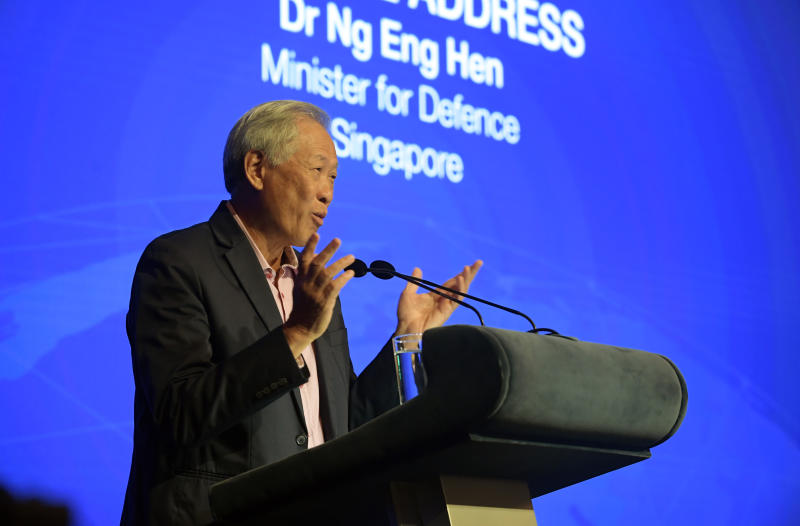Urgent need for rules-based order in the cyber domain, which will be more contested: Ng Eng Hen
Sign up now: Get ST's newsletters delivered to your inbox

Defence Minister Ng Eng Hen speaking at the opening dinner of the second Singapore Defence Technology Summit on June 26, 2019.
ST PHOTO: ALPHONSUS CHERN
SINGAPORE - Militaries are being reshaped by the threats and opportunities in the cyber domain, but with rules of engagement still vague in this new battlefront, there is an urgent need for a rules-based order, said Defence Minister Ng Eng Hen on Wednesday (June 26).
This rules-based order is needed to prevent serious disruptions and even the loss of lives, and to protect the functioning of society, especially when the cyber arena will become more contested, he added.
Speaking at the opening dinner of the second Singapore Defence Technology Summit at the Shangri-La Hotel, Dr Ng highlighted the cyber threat as among the newer, non-conventional ones that militaries around the world need to be prepared for, in addition to their traditional missions to protect sovereignty.
He said that, compared to a year ago when he spoke at the first summit, the technological space has become sharply contested, driven in part by US-China tensions.
Last week, the United States said it was adding several Chinese companies and a government-owned institute involved in supercomputing with military applications to its national security "entity list", barring them from buying US parts and components without government approval.
Last month, it had placed similar restrictions on Chinese telecommunications giant Huawei.
Dr Ng said that when the two countries with the largest economies and militaries compete, it is a given that all countries would be affected in some way or another.
"It would not be far off the mark to conclude that a technology race has already started, especially around emerging technologies that will shape our collective futures," he said.
"Countries, especially rivals, will always have differences but there is no cognitive dissonance in meeting and sharing views, even among strategic competitors," he added, citing how many lines of communication remained open between the United States and the Soviet Union during the height of the Cold War.
Some 400 participants from 23 countries are attending the three-day summit organised by the Defence Science and Technology Agency (DSTA) to discuss topics centred around the theme, Proliferation of Technology and its Implications on Defence, Security and Society.
The participants include defence technology policymakers, government chief technology officers, national armament directors, entrepreneurs and academics.
They will take part in a series of panel discussions examining technologies such as artificial intelligence, drones, and neuro-engineering.
Dr Ng said that militaries around the world are busy building up cyber capabilities to defend their terrain and protect the integrity of their systems, even against foreign interference during elections.
For instance, the Bundeswehr, or German armed forces, launched a new Cyber and Information Domain Service comprising more than 13,000 personnel tasked to protect and defend their critical networks and information systems in 2017.
Another "colossal" challenge, Dr Ng said, is to address the effects of climate change.
For instance, the flooding of coastal communities will affect migration and competition for land, food and water.
"What happens at either pole can affect communities, even cities thousands of kilometres away. Traditional fishing grounds have disappeared and with them, the livelihoods of communities," he said.
Terror attacks - another threat - put considerable strain on civilian and police resources that, even when fully mobilised, might not be able to deal with attacks on multiple sites, he said.
These threats will test the civilian resources of all countries, he said. Militaries will have to do more, sometimes with resource constraints, to deal with them, with much attention currently still geared towards traditional, conventional threats.
There will have to be closer interactions between the operational units and the defence technology community to optimise resources and improve responsiveness, he added.
For Singapore, such integration is key, "where scientists, engineers and military operators start ab-initio, to first define the problem and desired outcomes together before embarking on the design and implementation of the concepts of operations and the platforms required", he said.


